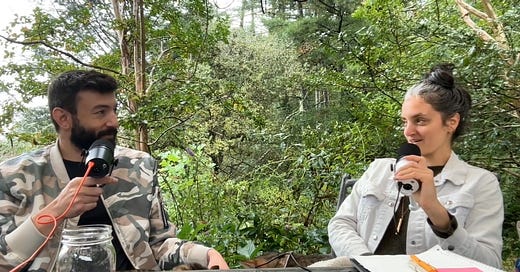In this episode, we explore emotional, psychological, and spiritual work through the lens of two distinct relational practices—Aletheia Unfolding (acceptance) and Kintsugi (cultivation). Self-acceptance and active transformation complement each other to foster deeper personal and relational growth and break us out of patterns that distance us from love to help us engage with life more fully.
We talk about…
The tension between introspection and external action
The pitfalls of over-reliance on self-reflection without making real-world changes, or trying to impose changes without sufficient inner work
Integrating these approaches for meaningful transformation: Aletheia provides deep self-awareness and emotional healing, while Kintsugi enables tangible change and growth in the outer world
The distinction between love and fear as motivating forces in life, and how one discerns authentic love from conditioned patterns
The importance of stepping outside one’s own perspective and the challenge of recognizing when one’s actions are driven by unconscious biases or unresolved emotions
Aletheia, a dyadic practice, is centered around the idea of “being with” a person in a state of poetic attunement. The goal is not to change or fix the client but to observe and welcome all parts of their experience with love, care, and curiosity. This has a loosening effect on old emotional patterns, which often melt away when they are fully seen and accepted. Through unconditional presence, deeper layers of the self can emerge and integrate, leading to shifts in how we relates to ourselves and others.
In contrast, Kintsugi focuses on cultivating the ability to shift states and update our meaning-making to develop a more sovereign, adult perspective. It emphasizes the importance of actively engaging with the parts of oneself that are stuck or reactive, learning to maintain a sense of choice and possibility rather than letting them run one’s life. This practice is more action-oriented, encouraging increasing tolerance for emotional and behavioral “hot” zones to create new, healthier patterns of behavior.
While Aletheia focuses on the internal relationship with oneself, Kintsugi involves practicing change in relationship to others, emphasizing the importance of real-world feedback and interaction in personal growth. Both approaches acknowledge that much of our psychological and emotional landscape is shaped by past relationships, and healing often requires a reintegration of those fragmented parts of the self within new, more supportive relationships. In Aletheia, we give these parts the time and space to be heard, which can allow them to soften and lose their hold on one’s behavior. In Kintsugi, the emphasis is on strengthening the adult self’s capacity to take charge and make decisions, allowing the childlike parts to be present but not “driving the car”. This creates a more nuanced understanding of personal growth, where both vulnerable and empowered parts of the self can coexist and inform each other.
It’s about the dynamic interplay between acceptance and change, introspection and action, love and fear, and the individual and the relational. It’s a nuanced view of personal growth as an ongoing process of integrating different parts of the self, cultivating greater sovereignty, and engaging with life in ways that are both deeply authentic and responsive to the broader relational and social context.
If you’d like to engage in or support this work, there are many ways to do so. You can work with Sofia-Jeanne in groups or one-on-one; you can work with Jared one-on-one; you can contribute to her patreon; you can talk to your friends about relational work; you can forward these posts; you can comment on this post or message me with your own experiences, reflections, questions, and ideas. Are there things you’d like me to write or talk about? Let me know.












Share this post